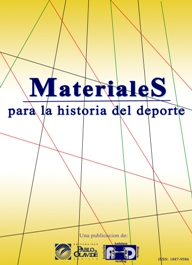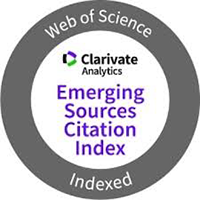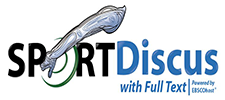Ethics in sport competition: values and negative values in competitive sports
Keywords:
ethics, sport, competition, values.Abstract
To understand the full complexity of both the potential and the limitations of competitive sports to educate and foster values we consider essential to turn our attention to ethical reflection in sport, and more specifically to the two lines of divergent thinking about the ethical value of sport competition. For some authors in the competitive nature of sport we find a deep ethical essence and transmitter of values, while for others in this competitive essence lies the greatest ethical problem of sports. Rather than siding with any of them, our intention is to try to show them and understand their complexity as both arguments have very interesting nuances. We end the paper presenting those essential principles that should guide sports competitions that seek to educate and teach values to their participants, protecting essential ethical principles.Downloads
References
Alvarez de Mon, Santiago. Aprendiendo a perder. Las dos caras de la vida, Barcelona: Plataforma Editorial, 2012.
Arnold, Peter J. Educación Física, movimiento y curriculum. Madrid: Morata, 1991.
Bailey, Charles. “Games, winning and education”, Cambridge Journal of Education, 5, 1, 1975, 40-50.
Cagigal, José María. Deporte, Pedagogía y Humanismo. Madrid: Publicaciones del Comité Olímpico Español, 1966.
Camacho, María José. “Contradicciones del significado de la actividad físico-deportiva en las identidades corporales de las chicas adolescentes”, Feminismo/s, 21, junio 2013, 15-35.
Carlin, John. “¿Hay consuelo para un corazón destrozado?”, El País, 11-12-2011.
Consejo de Europa. “Manifiesto Europeo sobre la Juventud y el Deporte”, Sports Information Bulletin, 5, 1995, 9.
Cortina, Adela. “Eugenesia y justicia social”, El País, 28-1-03.
Darwin, Charles. El origen del hombre, Madrid: Edaf, 1982.
De Villena, Luis Antonio. “Encomio del Deporte”, ABC, 22-2-86.
Durán, Javier. “¿El deporte transmite valores?”. En Los valores del ocio: cambio, choque e innovación, editado por Aurora Madariaga y Jaime Cuenca, 161-177. Bilbao: Universidad de Deusto, Documentos de Estudio de Ocio, 43, 2011.
Fraleigh, Warren P. The right actions in sport: Ethics for contestants. Champaign, Ill.: Human Kinetics, 1984.
Gala, Antonio. “La familia sí, pero…”, El País Semanal, 165, 17-4-94.
Galeano, Eduardo. “Los atletas químicos”, El Mundo, 27-4-01.
González Herrero, Carlos. Estudio de las tendencias de crecimiento de las modalidades deportivas españolas 1980-2005, en relación con los hábitos físicos de la población desde una perspectiva internacional comparada, Tesis Doctoral, Facultad de Ciencias de la Actividad Física y del Deporte – INEF, Universidad politécnica de Madrid, 2012.
Keating, James W. “Sportsmanship as a moral category”. En Sport and the Body, 2ª ed., editado por Ellen W. Gerber y William J. Morgan, Filadelfia: PA, Lea & Febiger, 1979.
López-Aranguren, José Luis. “Conducta ética y conducta agresiva: un enfoque filosófico”. En Agresión y Violencia en el Deporte. Un enfoque interdisciplinario. 185-190, Madrid: Instituto de Ciencias de la Educación Física y del Deporte, 1985.
López-Aranguren, José Luis. Ética. Madrid: Alianza Universidad, 1995.
Lüschen, Günther. “Análisis estructural del deporte”. En Sociología del Deporte, editado por Günther Lüschen y Kurt Weis, 46-58, Valladolid: Miñón, 1979.
Marías, Javier. “De cómo M y F me han quitado del fútbol”, El País, 5-2-2102.
Martens, Rainer. “Helping children become independent, responsible adults trough sports”. En Competitive sports for children and youth: an overview of research and issues, editado por Brown and Branta, Champaign, Ill.: Human Kinetics Publishers, 1978.
Meakin, Derek C. “The moral status of competition”, Journal of the Philosophy of Education, 20, 1, 1986, 59-67.
Muñoz Molina, Antonio. “La angustia del ganador”, El País, 2-1-1995.
Orlick, Terry y Botterill, Cal. “Why eliminate kids?”. En Sport Sociology: Contemporary Themes, editado por Yiannakis, McIntyre, Melnick y Hart, Iowa: Kendall/Hunt, 1976.
Ortega, Gema; Giménez, Javier; Jiménez, Concepción; Franco, Jorge; Durán, Javier y Jiménez, Pedro Jesús, Introducción al Valorcesto, Madrid: Fundación Real Madrid, 2012.
Perry, Louis R. “Competition and cooperation”, British Journal of Educational Studies, XXIII, 2, junio 1975.
Piaget, Jean. El juicio moral en el niño. Barcelona: Martínez Roca, 1984.
Ramón-Cortés, Francisco. “Cuidado con la obsesión por ganar”, El País Semanal, 11-9-2011.
Rapoport, Anatol. Fights, Games, and Debates. Ann Arbor: University of Michigan Press, 1960.
Rawls, John. Teoría de la justicia. Madrid: Fondo de Cultura Económica, 1995.
Sámano, José. “Mito entre mitos”, El País, 15-9-2010.
Sánchez, Ricardo y Sánchez, Jorge. “Culturas deportivas y valores sociales: una aproximación a la dimensión social del deporte”, Apunts. Educación Física y Deportes, 64, 2º trimestre, 2001, 33-45.
Sánchez Ferlosio, Rafael. La hija de la guerra y la madre de la patria. Barcelona: Destino, 2002.
Savater, Fernando. Ética para Amador. Barcelona: Ariel, 1991.
Savater, Fernando. Diccionario de Filosofía. Barcelona: Planeta, 1995.
Savater, Fernando. El valor de educar. Barcelona: Ariel, 1997.
Schwartz, Shalom H. y Bilsky, Wolfgang. “Toward a Theory of the Universal Content and Structure of Values: Extensions and Cross-Cultural Replications”, Journal of Personality and Social Psychology, 58, 5, 1990, 878-891.
Séneca, Tratados Morales, Barcelona: Planeta, 2012.
Simon, Robert L. Fair-Play. Sport, Values and Society. San Francisco: Westview Press, 1991.
Trueba, David. “Hagan juego”, El País, 27-1-12.
Valenciano, Mauro. Aprender a ganar. La competición en el desarrollo de los deportistas. Barcelona: Inde, 2012.
Vicent, Manuel. “Pep Guardiola. El fútbol puede ser una moral”, El País, 5-11-2011.
Vicent, Manuel. “El vacío”, El País, 10-2-2013.
Downloads
Published
Issue
Section
License
Authors who submit to this journal agree to the following terms:
- Author(s) keep copyright and guarantee to the journal the right to be the first publication of the work as licensed under Creative Commons Attribution-Noncommercial-ShareAlike 4.0 International as initial publication in this journal.
- Author(s) can establish additional agreements for non-exclusive distribution of the version of the work published in the journal (for example, to an institutional archives or to publish it in a book), with an acknowledgment of its initial publication in this journal.
- It is allowed and authors are encouraged to disseminate their work electronically (e.g, in institutional open archives or on their own website) before and during the submission process, as it can lead to productive exchanges, as well as a citation earlier and more of published work (See the Effect of Open Access).












